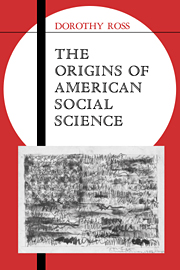Book contents
- Frontmatter
- Contents
- Acknowledgments
- Abbreviations used in the footnotes
- Introduction
- Part I European social science in antebellum America
- 1 The discovery of modernity
- 2 The American exceptionalist vision
- Part II The crisis of American exceptionalism, 1865–1896
- Part III Progressive social science, 1896–1914
- Part IV American social science as the study of natural process, 1908–1929
- Epilogue
- Bibliographical note
- Indexes
- Ideas in Context
1 - The discovery of modernity
Published online by Cambridge University Press: 23 September 2009
- Frontmatter
- Contents
- Acknowledgments
- Abbreviations used in the footnotes
- Introduction
- Part I European social science in antebellum America
- 1 The discovery of modernity
- 2 The American exceptionalist vision
- Part II The crisis of American exceptionalism, 1865–1896
- Part III Progressive social science, 1896–1914
- Part IV American social science as the study of natural process, 1908–1929
- Epilogue
- Bibliographical note
- Indexes
- Ideas in Context
Summary
The social sciences began in America by importing and adapting models of political economy, political science, and sociology developed in Europe in the eighteenth and early nineteenth centuries. These were new ways of understanding the historical world, born out of a new kind of historical consciousness and shaped by the emerging contours of capitalist society.
The social sciences originated in the eighteenth century in an effort to understand the character and future of modern society. Montesquieu's Spirit of the Laws (1748), Adam Smith's Wealth of Nations (1776), Condorcet's Outline of an Historical View of the Progress of the Human Mind (1795), and J. G. Herder's Ideas towards a Philosophy of History (1784–91) were exemplary texts of the new sciences. Premised on a decisive difference between modern society and its feudal and ancient forerunners, they envisioned social sciences that would guide modern society into the future. The effort to create social sciences was bound up with the discovery that history was a realm of human construction, propelled ever forward in time by the cumulative effects of human action, and taking new qualitative forms.
This understanding of history was a late and complex achievement of the modern West. At the end of the Middle Ages, history was not intelligible in terms of human actions. The ultimate causes and meaning of historical events on earth were understood by Christian minds to lie in the supernatural world, in the sequence of eternal Christian time within which earthly history was enacted.
- Type
- Chapter
- Information
- The Origins of American Social Science , pp. 3 - 21Publisher: Cambridge University PressPrint publication year: 1990

